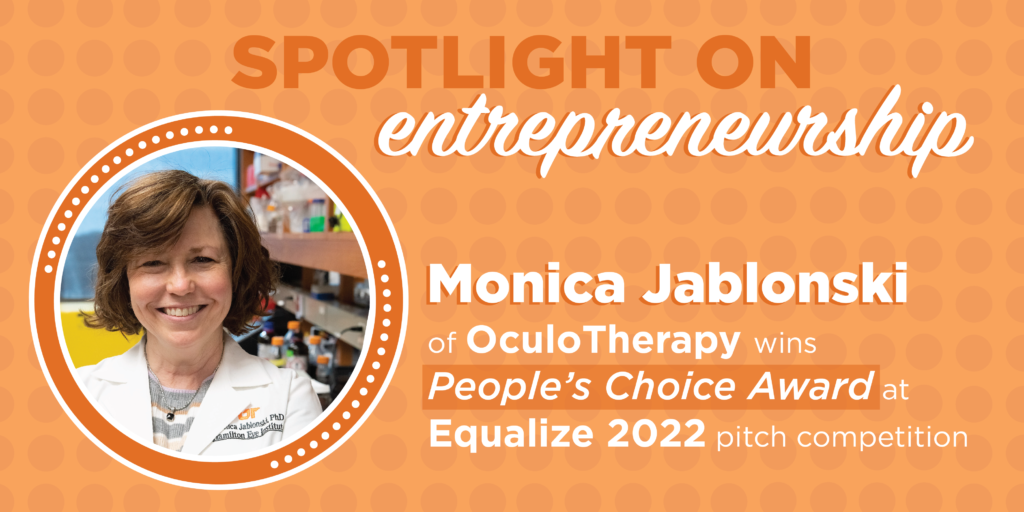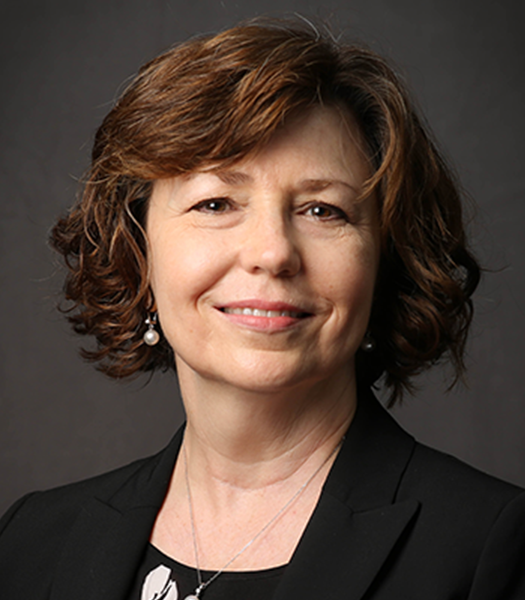
Glaucoma is the number one cause of irreversible blindness, with 3 million people around the country currently being treated for the disease. Monica Jablonski, a University of Tennessee Health Science Center researcher, studies the various causes of blinding disorders to develop better treatments used to limit vision loss. Her startup, OculoTherapy, offers a novel treatment, Calseetra, that addresses failures of current glaucoma medications. With the encouragement of the University of Tennessee Research Foundation, Jablonski recently participated in Equalize 2022. It is a virtual mentor program and pitch competition designed to take national action around the disparity of women academic inventors forming university startups. Participating in what was only her second pitch competition, she secured the People’s Choice Award in the therapeutics category.

Jablonski is the Hamilton Professor and Vice Chair and Director of Research at UTHSC’s Hamilton Eye Institute. She is also the Founder and Chief Scientific Officer of OculoTherapy. She founded the startup around 10 years ago. While the idea of starting a company was daunting, she wanted to develop a tangible product that could help patients with visual disorders.
Everybody is afraid of losing their vision,” said Jablonski. “We’re not planning on curing anything – curing an ocular disease is a long way off. We are developing treatments to slow vision loss. It’s something we can do rapidly and have a positive impact on patients’ lives.”
Research indicates that over 40% of patients stop taking their glaucoma medications due to harmful side effects, frequent dosage schedules and loss of efficacy over time. Jablonski developed Calseetra to combat these issues. The once-daily treatment eliminates intraocular pressure (IOP) fluctuations, falls into a new drug class, offers no documented side effects and should increase patient adherence.
We tried very hard to keep the patients in mind,” said Jablonski. “To not just create something, but to create something that patients would tolerate. And overcome the problems associated with current drugs. We’ve been mindful from the very beginning when we designed and engineered our formulation.”
The UTRF team encouraged Jablonski to apply to the Equalize 2022 program and helped her prepare her presentation for entry. “It was a fun, great experience. We’ve been working on our pitch for a few years, but this is the first time we pitched to someone who wasn’t one of our mentors,” said Jablonski. “I really liked that the program focused on women. Being in an environment where you are surrounded by women is something that builds confidence and offers an opportunity for women to support each other.”
Four years ago, UTRF connected Jablonski with Entrepreneur-in-Residence Chris West, who helped OculoTherapy, especially in the beginning days of the startup. “I was fortunate enough to just have the right people to support me, including UTRF, that has always been very supportive of everything that we’ve done,” said Jablonski. “I’ve had really, really good mentors. We’ve been very fortunate to have lots of people have an interest in what we’re doing and help us along the way.”
One of the best parts about working with UTRF is watching technology, startups and brilliant inventors scale and grow,” said UTRF Vice President Maha Krishnamurthy. “We are so excited for what comes next for OculoTherapy, Calseetra and Jablonski.”
Since its founding, OculoTherapy has made significant progress in developing Calseetra, receiving considerable amounts of non-dilutive funding. Currently, Jablonski and her team are using the data generated from that funding to go before the FDA by the end of the summer for a pre-investigational new drug (IND) meeting.
We’re hoping that before the end of summer, we will have our guidance from the FDA,” said Jablonski. “At that point, we would like to start seeking outside investor support so we can make more rapid progress as we sprint toward the finish line of FDA approval.”